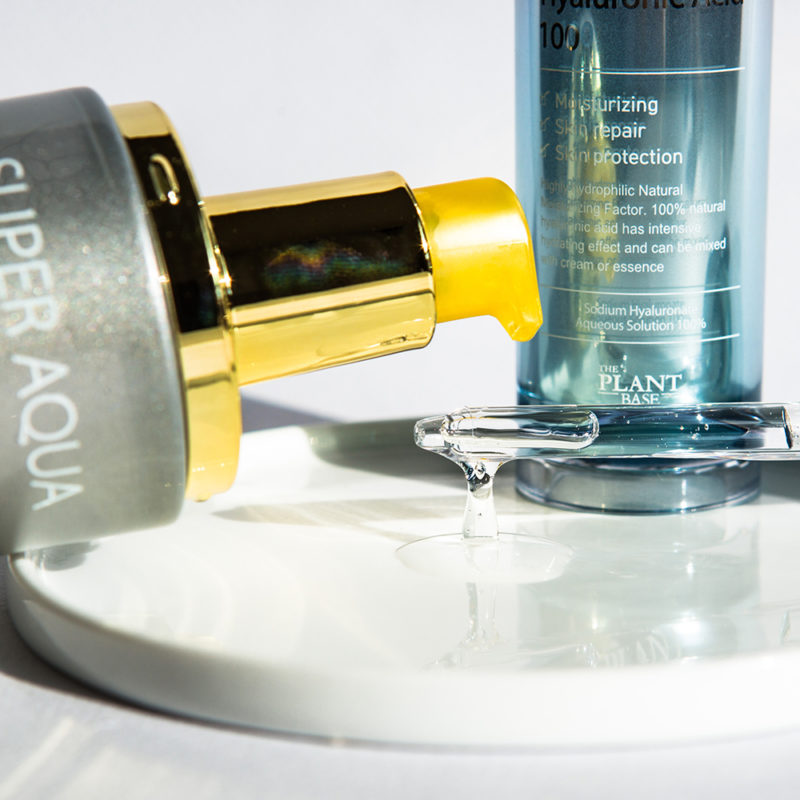Not all powerful skin care ingredients prefer to be solo acts. Discover those that can be mixed and matched without causing negative reactions below.
There’s a lot of talk about what skin care ingredients you should never mix together. For example, due to its inherent volatility, vitamin C tends to react poorly when mixed with a handful of ingredients, including retinol, niacinamide, and alpha and beta hydroxy acids. Similarly, retinol shouldn’t be mixed with salicylic acid (a BHA) or benzoyl peroxide.
But our goal here today isn’t to focus on what you can’t mix (for more on that, click here), but to instead give you the green light on ingredients that tend to play nicely with others.
Hyaluronic Acid
Like vitamin E, hyaluronic acid is one of the most prevalent ingredients in skin care — especially when it comes to moisturizers and serums. The potent humectant (sometimes listed as sodium hyaluronate) even mixes well with some of skin care’s touchiest ingredients, including retinol and vitamin C.
Feel free to layer your pre-formulated products that contain hyaluronic acid with other products without worrying about a bad reaction. You can also apply a couple drops of pure hyaluronic acid to your favorite moisturizing products, or you can apply straight to your face layering other products under or over. The Plant Base Waterfall Moist Balanced Hyaluronic Acid 100, which is pure hyaluronic acid, is a great stand-alone or mixing booster.
SPF
You’ve been skin-schooled enough to know that SPF (30 or higher) is the most important step of any beauty regimen. Fortunately, it mixes well with other ingredients, which means you can layer it without worrying about any bad reactions. In fact, it’s wise to apply extra moisturizers underneath for a boost of hydration throughout the day.
“Vitamin C serum provides antioxidant benefits and can be especially protective when worn under sunscreen,” notes Dr. Jeanette M. Black, a board-certified dermatologist at Skin Care and Laser Physicians of Beverly Hills. “Also, hyaluronic acid serums and moisturizing creams can help provide added hydration when worn under sunscreen.”
She adds that sunscreen should be the last thing applied to skin every morning before makeup, and that any additional SPF in foundations or powders is an extra bonus — not a replacement. Try Neogen’s Day-Light Protection Airy Sunscreen.
RELATED: Do You Still Need to Wear Sunscreen If Your Foundation Contains SPF 50?
Snail Mucin
Snail mucin (aka snail slime) has received much attention both in and out of the K-Beauty world. Though trendy, the ingredient isn’t a gimmick; studies have shown its ability to improve skin texture and it may even improve signs of aging when used consistently.
More good news: snail mucin is a gentle, active ingredient that all skin types can benefit from. It’s even considered a good replacement for more aggressive active ingredients, such as retinol and hydroquinone, both of which don’t mix so well with others.
Because it acts as a humectant, snail mucin layers well with hydrating ingredients, in particular. Try The Klog’s Snail Mucin Energy Essence or Benton Snail Bee Ultimate Serum.
Vitamin E
From lip balms to sunscreen to serums, vitamin E can be found in a host of different beauty products — and for a good reason! This reliable, lipid-soluble ingredient is soothing to the skin. It’s also rich in antioxidants, which means that it protects and heals from environmental pollutants and stressors.
In skin care products, it’s usually listed as tocopherol or tocopheryl acetate, which are two of the most common forms of vitamin E. You can also add a couple drops of pure vitamin E oil to your existing products, or to your DIY skin care recipes.
Sidenote: As a general rule, vitamins work well with other vitamins. In fact, you’ll find that many products are already formulated with multiple vitamins. A, C, and E are especially great teammates. Try pairing Klairs Freshly Juiced Vitamin E Mask with the brand’s Freshly Juiced Vitamin C Serum.
Jojoba Oil
There are a handful of carrier oils that mix well with other skin care ingredients, such as rosehip, argan, and camellia, but jojoba remains one of the most common and trusted. You can mix it with any other oil under the sun, including essential oils, and it also does well with a wide range of active ingredients. Apply it straight or add a couple drops to your favorite moisturizer, BB cream, physical exfoliator, cleanser, or even hair conditioner.
Bottom Line
The ingredients mentioned above may be skin-friendly and gentle, but they still pack a punch. The old saying “beauty is pain” doesn’t always apply!
